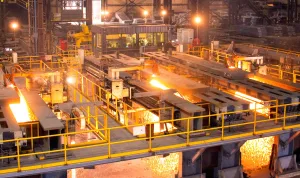How a China-US Military Conflict Could Impact the Global Steel Market: An In-Depth Analysis

The potential for a military conflict between China and the United States is a topic of significant concern, not only for geopolitical stability but also for global economic markets. Among the many sectors that would be affected, the global steel market stands out due to its critical role in infrastructure, manufacturing, and national security. This article explores the possible impacts of a China-US military conflict on the global steel market, examining the economic, supply chain, and strategic consequences.
1. The Importance of China and the US in the Global Steel Market
a. China’s Dominance:
- China is the world’s largest producer and consumer of steel, accounting for more than 50% of global steel production. Its massive steel industry is a cornerstone of the country’s economic growth and infrastructure development.
b. US Steel Industry:
- The United States, while not as dominant in production, is a major player in the global steel market. It imports a significant amount of steel to meet its industrial and defense needs.
2. Immediate Economic Consequences
a. Disruption of Trade:
- A military conflict between China and the US would severely disrupt trade flows. Sanctions, tariffs, and blockades could halt the export and import of steel, leading to immediate supply shortages.
b. Price Volatility:
- The disruption in supply would cause extreme price volatility in the global steel market. Prices could skyrocket due to scarcity, impacting industries worldwide that rely on steel for production.
3. Supply Chain Impacts
a. Raw Material Shortages:
- The conflict could impede the supply of critical raw materials used in steel production, such as iron ore and coking coal. Both China and the US are significant players in the mining and processing of these materials.
b. Manufacturing Slowdowns:
- Industries dependent on steel, such as automotive, construction, and manufacturing, would face slowdowns or shutdowns due to material shortages. This would ripple through global supply chains, causing widespread economic disruption.
4. Strategic and Geopolitical Consequences
a. National Security Concerns:
- Steel is vital for national security, used in the production of military vehicles, ships, and infrastructure. Both China and the US would prioritize domestic steel for defense purposes, further tightening global supply.
b. Shift in Global Alliances:
- Countries may be forced to choose sides or seek alternative steel sources, leading to shifts in global alliances and trade partnerships. This realignment could have long-term geopolitical implications.
5. Long-term Market Adjustments
a. Investment in Domestic Production:
- Nations may accelerate investment in domestic steel production to reduce dependency on imports. This could lead to the development of new steel plants and technological innovations.
b. Diversification of Supply Chains:
- To mitigate future risks, companies and countries might diversify their supply chains, sourcing steel from multiple regions to avoid over-reliance on any single source.
c. Emergence of New Players:
- Countries with untapped steel production potential, such as India and Brazil, could emerge as significant players in the global market, filling the void left by disrupted China-US trade.
6. Environmental and Sustainability Implications
a. Green Steel Initiatives:
- The conflict might spur innovation in green steel production as countries look for sustainable alternatives. Investments in electric arc furnace technology and hydrogen-based steelmaking could increase.
b. Regulatory Changes:
- Governments may implement new regulations to ensure steel supply security, including strategic reserves and environmental standards to promote sustainable production.
Conclusion
A military conflict between China and the United States would have profound and far-reaching effects on the global steel market. From immediate economic turmoil and supply chain disruptions to long-term strategic realignments and environmental considerations, the consequences would reshape the industry. Understanding these potential impacts highlights the importance of proactive measures, such as diversifying supply chains and investing in sustainable production, to mitigate risks and ensure stability in the global steel market.



